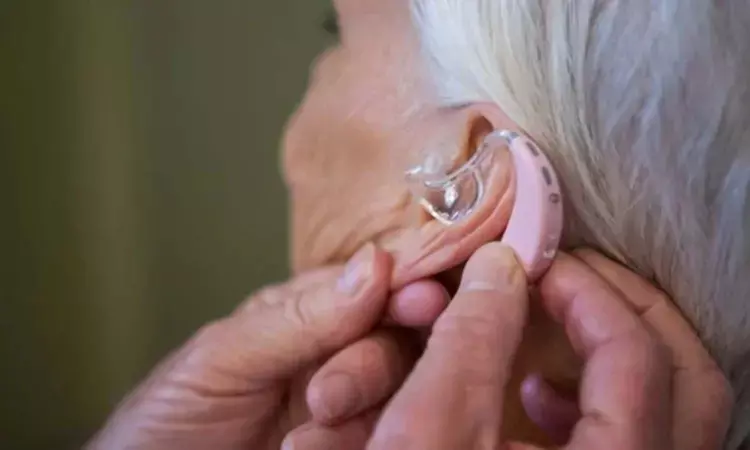- Home
- Medical news & Guidelines
- Anesthesiology
- Cardiology and CTVS
- Critical Care
- Dentistry
- Dermatology
- Diabetes and Endocrinology
- ENT
- Gastroenterology
- Medicine
- Nephrology
- Neurology
- Obstretics-Gynaecology
- Oncology
- Ophthalmology
- Orthopaedics
- Pediatrics-Neonatology
- Psychiatry
- Pulmonology
- Radiology
- Surgery
- Urology
- Laboratory Medicine
- Diet
- Nursing
- Paramedical
- Physiotherapy
- Health news
- Fact Check
- Bone Health Fact Check
- Brain Health Fact Check
- Cancer Related Fact Check
- Child Care Fact Check
- Dental and oral health fact check
- Diabetes and metabolic health fact check
- Diet and Nutrition Fact Check
- Eye and ENT Care Fact Check
- Fitness fact check
- Gut health fact check
- Heart health fact check
- Kidney health fact check
- Medical education fact check
- Men's health fact check
- Respiratory fact check
- Skin and hair care fact check
- Vaccine and Immunization fact check
- Women's health fact check
- AYUSH
- State News
- Andaman and Nicobar Islands
- Andhra Pradesh
- Arunachal Pradesh
- Assam
- Bihar
- Chandigarh
- Chattisgarh
- Dadra and Nagar Haveli
- Daman and Diu
- Delhi
- Goa
- Gujarat
- Haryana
- Himachal Pradesh
- Jammu & Kashmir
- Jharkhand
- Karnataka
- Kerala
- Ladakh
- Lakshadweep
- Madhya Pradesh
- Maharashtra
- Manipur
- Meghalaya
- Mizoram
- Nagaland
- Odisha
- Puducherry
- Punjab
- Rajasthan
- Sikkim
- Tamil Nadu
- Telangana
- Tripura
- Uttar Pradesh
- Uttrakhand
- West Bengal
- Medical Education
- Industry
Hearing aids fail to slow Cognitive Decline in high risk elderly individuals

A recent study, known as the ACHIEVE study published in the The Lancet has shed light on the connection between hearing loss and cognitive decline in older adults. The study by Frank Lin and team aimed to investigate whether a hearing intervention could mitigate cognitive decline in cognitively healthy older adults with untreated hearing loss.
Conducted at four community study sites across the USA, the ACHIEVE study was a multicentre, parallel-group, unmasked, randomised controlled trial targeting adults aged 70–84 years. The participants had untreated hearing loss but lacked substantial cognitive impairment. They were recruited from two distinct study populations: older adults participating in the long-standing observational study of cardiovascular health (Atherosclerosis Risk in Communities [ARIC] study) and healthy de novo community volunteers.
In the trial, the participants were randomly divided into two groups. The first group received a hearing intervention involving audiological counselling and provision of hearing aids. The second group, serving as the control, received health education with individual sessions covering topics on chronic disease prevention. The participants were monitored every six months, and the primary endpoint was the 3-year change in global cognition standardized factor scores from a comprehensive neurocognitive battery.
The results, published recently, revealed that 977 participants (32·5% of those screened) were assigned to the intervention. Among them, 50% received the hearing intervention, and the remaining 50% received health education as the control. The average age of the participants was 76·8 years, with a slight majority being female (54%) and most identifying as White (88%).
In the primary analysis of the entire cohort, the hearing intervention did not show a significant reduction in 3-year cognitive decline compared to the health education control. However, a prespecified sensitivity analysis indicated that the impact of the hearing intervention differed between the ARIC and de novo study populations. This finding suggests that the hearing intervention might be effective in reducing cognitive decline over three years in populations of older adults at higher risk for cognitive decline but not in those at lower risk.
Reference:
Lin, F. R., Pike, J. R., Albert, M. S., Arnold, M., Burgard, S., Chisolm, T., Couper, D., Deal, J. A., Goman, A. M., Gravens-Mueller, L., Mosley, T., Pankow, J. S., Reed, N. S., … Coresh, J. (2023). Hearing intervention versus health education control to reduce cognitive decline in older adults with hearing loss in the USA (ACHIEVE): a multicentre, randomised controlled trial. In The Lancet. Elsevier BV. https://doi.org/10.1016/s0140-6736(23)01406-x
Neuroscience Masters graduate
Jacinthlyn Sylvia, a Neuroscience Master's graduate from Chennai has worked extensively in deciphering the neurobiology of cognition and motor control in aging. She also has spread-out exposure to Neurosurgery from her Bachelor’s. She is currently involved in active Neuro-Oncology research. She is an upcoming neuroscientist with a fiery passion for writing. Her news cover at Medical Dialogues feature recent discoveries and updates from the healthcare and biomedical research fields. She can be reached at editorial@medicaldialogues.in
Dr Kamal Kant Kohli-MBBS, DTCD- a chest specialist with more than 30 years of practice and a flair for writing clinical articles, Dr Kamal Kant Kohli joined Medical Dialogues as a Chief Editor of Medical News. Besides writing articles, as an editor, he proofreads and verifies all the medical content published on Medical Dialogues including those coming from journals, studies,medical conferences,guidelines etc. Email: drkohli@medicaldialogues.in. Contact no. 011-43720751


